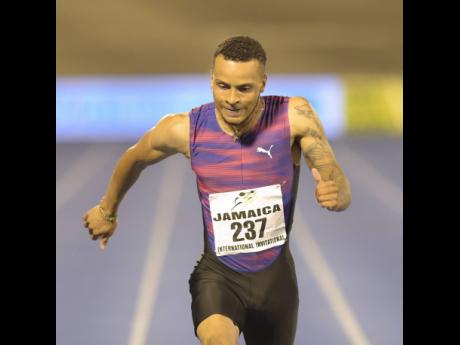De Grasse weighs in on Olympic postponement
Andre De Grasse now has the chance to be a major part of the sprint show at the Tokyo Games.
For that, he’s breathing a little easier.
A day ago, Canada’s fastest man wasn’t sure he would be allowed to take to the starting line, even if he wanted to. His country decided to not send a team to the Olympics due to the coronavirus pandemic, unless the games were delayed a year.
They were, and now he’s back on course.
Yesterday, the International Olympic Committee (IOC) postponed the Olympics until 2021. The announcement was recognition of the reality that training and qualifying schedules have been completely disrupted as the coronavirus spreads.
This was supposed to be De Grasse’s year – his first chance for Olympic gold without Usain Bolt looming a few steps away. Only a new crop of talent has arrived on the scene in Americans Christian Coleman and Noah Lyles.
It’s shaping up to be quite a showdown, one that De Grasse certainly wanted in on, and now can be, given the IOC decision not to start the games on July 24 as scheduled.
GLOBAL SPORTS CALENDAR
Next on the agenda for the IOC and organisers is picking a date when it might be safe again to hold such a big event. They’ll also have to rearrange the 2021 global sports calendar.
De Grasse is, by most measures, Canada’s highest-profile summer sports star. The country brought 314 athletes to the Rio de Janeiro Games in 2016. It captured 22 medals, with De Grasse bringing home three.
Although De Grasse wasn’t contacted individually by Team Canada in regard to its decision not to send athletes to Tokyo before the IOC decision to postpone, he did receive a survey.
He didn’t fill it out.
“I didn’t know how I felt about the situation at the time,” explained De Grasse, who has seven Olympic and World Championships medals to his credit. “I was letting it go and playing it by ear day by day and seeing if this things got better.
“They’re trying to protect us. We’re humans first and athletes second. We’ll get through this.”
These days, he’s in Florida with his girlfriend, American hurdler Nia Ali. Now that cities and states are closing gyms and urging social distancing, his workouts have been reduced to running on a football field and chasing around their daughter, Yuri, who turns 2 in June. Ali also has a son, Titus.
“I’m with the kids, at home, a lot,” De Grasse cracked. “I feel like I’m active because I’m chasing them around. We go swimming in the backyard.”
De Grasse burst on the scene in 2015, when he tied for the 100m bronze medal at the World Championships in Beijing. Back then, he was just a role player in the showdown between Bolt and American rival Justin Gatlin.
A year later at the Rio Games, De Grasse took centre stage and clowned around with Bolt, though it wasn’t all fun and games. De Grasse ended up earning silver during the 200 in Brazil, along with bronze medals in the 100m and as part of the 4x100m relay team.
He occasionally watches his Olympic races – for inspiration.
“There’s a lot of motivation to say to myself, ‘I can be one of the fastest men in the world’,” De Grasse recounted. “When I watch, it fuels that and makes me hungry to win again and have that feeling that I felt in Rio.”
He’s healthy again, too.
Bothered by hamstring injuries in 2017 and in ‘18, he flashed his familiar – and fast – form at the World Championships last fall in Doha, Qatar. De Grasse took bronze in the 100m behind Coleman and Gatlin. Later, he picked up silver in the 200m behind Lyles.
A rematch in Tokyo?
De Grasse has that chance.

